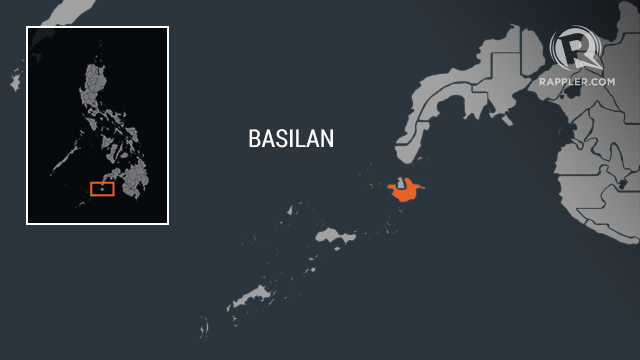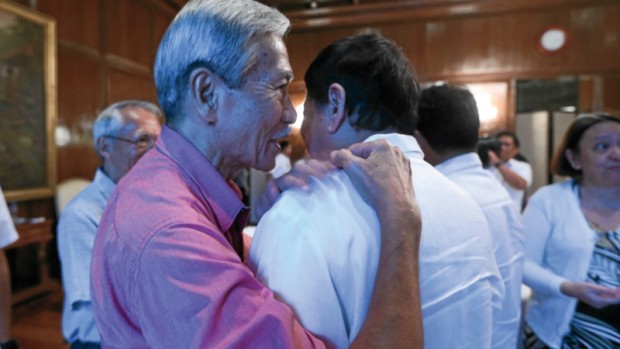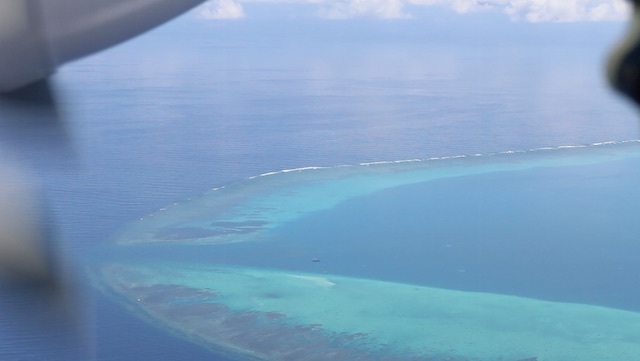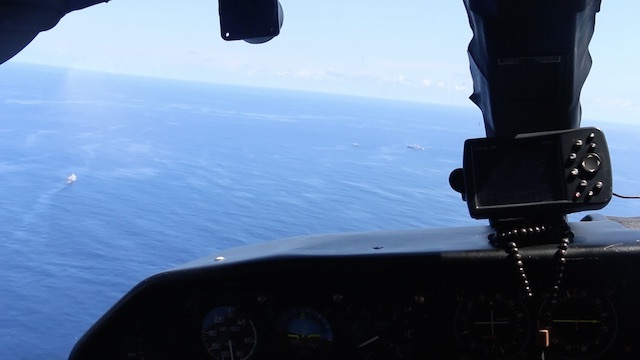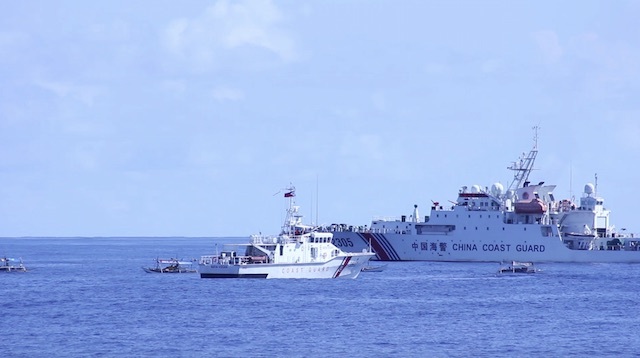From the online Foreign Policy Magazine (Nov 7):
Donald Trump’s Peace Through Strength Vision for the Asia-Pacific
How the Republican nominee will rewrite America’s relationship with Asia

In 2011, then-Secretary of State Hillary Clinton
announced with great fanfare in
Foreign Policy that the United States would begin a military “pivot” to the Asia-Pacific. This beating of the American chest was done against the backdrop of China’s increasing assertiveness in the region and the sense among many longtime American allies that the United States had lost sight of Asia’s strategic importance during 10 years of Middle Eastern wars.
President Barack Obama’s administration was right to signal reassurance to our Asian allies and partners. However, this pivot (and later “rebalance”) failed to capture the reality that the United States, particularly in the military sphere, had remained deeply committed to the region. This pivot has also turned out to be an imprudent case of talking loudly but carrying a small stick, one that has led to more, not less, aggression and instability in the region.
Initially, Clinton’s pivot and the Obama administration’s stated interest in countering China’s rising clout were met with general bipartisan agreement in Congress. Inside the Beltway, the analyst community also appeared to share a similar consensus that the global financial crisis had emboldened China. As one of Washington’s leading experts on Chinese foreign and security policy, Bonnie Glaser, told one of the authors in an on-camera interview: “The Chinese saw the United States as weakened by the financial crisis; and it created opportunities for China to test the United States and to try and promote its interests in its periphery in the hopes that the United States would not respond forcefully.”
With China’s multi-decade military modernization program bearing fruit — fueled ironically in no small part by the fruits of its large trade surplus with the United States — Beijing was in a prime position to flex its muscles. Washington’s pivot seemed to be an appropriate and timely response.
It did not take long, however, for the pivot to falter. Initially, it would mostly feature token gestures of American diplomatic and military support, for example, sending
littoral combat ships to Singapore and
2,500 Marines to Darwin, Australia. However, over time, the administration would
drastically cut the U.S. military — particularly by
shrinking a U.S. Navy expected to be the tip of the pivot spear. Upon doing the pivot math, U.S. Naval War College professor Toshi Yoshihara soberly concluded in an interview that a “shrinking fleet” would “nullify our attempts to pivot to Asia.” His colleague and
co-author James Holmes would more bluntly say in a separate interview that the pivot was “bush league.”
Curiously, the one aspect of the rebalance that seemed to most energize the administration was an economic rather than military gambit. This was pushing for passage of the Trans-Pacific Partnership (TPP), a trade mega-deal involving 12 Pacific Rim countries accounting for “
nearly 40 percent of global GDP.” Clinton herself called it the “
gold standard” of trade deals. Against the backdrop of the pivot, the TPP deal was sold to the American public not as a way to increase urgently needed economic growth. (Voters have become increasingly immune to that failed siren song as millions of American jobs have been
shipped overseas.) Rather, Obama and Clinton billed the TPP as a national security measure to help contain a rising China. As Ash Carter, Obama’s current defense secretary,
asserted, passing TPP is as “important to me as another aircraft carrier.”
Of course, none of this — neither the shrinking “small stick” U.S. Navy nor a new “talk loudly” pivot — was lost on a rapidly militarizing China. While the United States continues to endure both a shrunken force and a readiness crisis brought about by sequestration, Beijing has created some
3,000 acres of artificial islands in the South China Sea with very limited American response. Beijing has also unilaterally
declared an “air defense identification zone” in the East China Sea, expanded its illegitimate territorial claims everywhere from
India to
Indonesia, and further
worsened its already loathsome human rights record.
It’s not just that Secretary Clinton’s weak pivot follow-through has invited Chinese aggression in the East and South China Seas. She also faithfully
executed the Obama administration’s failed policy of “strategic patience” with North Korea — a foreign-policy doctrine that has produced nothing but heightened instability and increased danger.
Indeed, since Obama took office, the North has conducted
four nuclear tests and
sunk a South Korean navy vessel. It has also pursued a vigorous ballistic missile program that has put Pyongyang on the path to both
miniaturizing a warhead and developing a missile capable of reaching America’s West Coast. Today, despite repeated American warnings and U.S. entreaties to China to bring its
wild child under control, the Kim regime remains firmly in power, the North Korean people remain oppressed and poverty-stricken, and the danger to America and its allies is more acute. So much for patience.
American allies and partners in the region have been disheartened by a foreign policy that has veered from feckless to mendacious.
American allies and partners in the region have been disheartened by a foreign policy that has veered from feckless to mendacious. The Philippines’s recent high-profile rejection of American leadership, and open courtship with China, is a further setback in Asia for the Obama-Clinton foreign policy. This setback may be traced directly back to Hillary Clinton. Few in Washington remember that the Obama administration pointedly refused to intervene in 2012 when China
blatantly violated a diplomatic agreement brokered by Secretary Clinton’s right-hand man in the region, Kurt Campbell; Beijing shredded that agreement by brazenly seizing Scarborough Shoal from the Philippines after agreeing to stand down. Washington’s utter failure to uphold its obligations to a longtime, pivotal ally during one of its most humiliating crises has no doubt contributed to Philippine President Rodrigo Duterte’s low opinion of American security guarantees — and his
recent move toward a China alliance.
Obama’s infamous “red line” pronouncement in Syria likewise was
perceived throughout the Asia-Pacific region as an open invitation for aggression against U.S. allies and partners. Obama’s meekness cast doubt on Washington’s willingness to enforce long-standing security commitments in the face of Chinese or North Korean aggression. This disastrous mistake has been further compounded by a string of failures in our bilateral relations with key countries since 2009. Indeed, the litany of allies and partners mistreated under this administration is distressingly long, and the cumulative effect has been a clear diminution in U.S. regional clout relative to China.
For example, Thailand, a key U.S. treaty ally with a chaotic and unstable domestic political situation, was unceremoniously booted from Washington’s embrace following a military coup. It is now aligning itself more closely with Beijing,
even in security matters.
The Obama administration’s treatment of Taiwan has been equally egregious. This beacon of democracy in Asia is perhaps the most militarily vulnerable U.S. partner anywhere in the world. As far back as 2010, the U.S. Defense Intelligence Agency
warned that the balance of power in the skies above the Taiwan Strait was shifting toward Beijing. Yet Taiwan has been repeatedly
denied the type of comprehensive arms deal it needs to deter China’s covetous gaze, despite the fact that such assistance is guaranteed by the legally binding Taiwan Relations Act.
Fortunately, the United States has tremendous opportunities to reclaim its geostrategic position in Asia.
Fortunately, the United States has tremendous opportunities to reclaim its geostrategic position in Asia. This is due mainly to China’s own miscalculations and the overplaying of its hand.
Almost in spite of the Obama administration’s repellant policies, U.S. partners like Japan, South Korea, India, and even Myanmar and Vietnam continue to seek closer ties with Washington across the spectrum. They view Beijing as a bully and potential aggressor that must be balanced against. The next administration will be well-placed to seize these strategic opportunities — if it has the will and vision to do so.
To turn this situation around, the White House will require a leader who understands the challenges we face while boldly seizing openings to further our interests. If past is prologue, Hillary Clinton’s position overseeing the failed pivot has revealed that she is wholly unsuited to rebuild an Asia policy that she has already helped severely wound.
Donald Trump has been clear and concise on his approach to U.S. foreign policy. It begins with a clear-eyed appraisal of U.S. national interests and a willingness to work with any country that shares our goals of stability, prosperity, and security.
Trump’s approach is two-pronged. First, Trump will never again sacrifice the U.S. economy on the altar of foreign policy by entering into bad trade deals like the North American Free Trade Agreement, allowing China into the World Trade Organization, and passing the proposed TPP. These deals only weaken our manufacturing base and ability to defend ourselves and our allies.
Second, Trump will steadfastly pursue a strategy of peace through strength, an axiom of Ronald Reagan that was abandoned under the Obama administration. He knows, however, that this will be a difficult task. As former Air Force Secretary Mike Wynne has
warned:
Under the Obama administration, the Navy has shrunk to its smallest size since World War I. The Army is the smallest it has been since before World War II. The Air Force is the smallest in its history, and its aircraft are the oldest. Readiness levels across the services are the worst in a generation, with pilots facing significantly reduced cockpit time and deferring critical maintenance, Navy ships and crews deploying as long as 10 months, and Army units are deferring critical training before deployments. The horror story of naval aviators taking spare aircraft parts from museums to keep their planes flying is simply unacceptable for those who wear our nation’s uniform.
Trump has pledged to work with Congress to repeal defense sequestration, a cause with bipartisan support in both chambers.
Trump has pledged to work with Congress to repeal defense sequestration, a cause with bipartisan support in both chambers. He has laid out the most detailed
plan for rebuilding our military of any recent presidential nominee. This is in stark contrast to Clinton’s near total silence on the issue.
Lee Kuan Yew, the legendary founder of Singapore, was candid about what the U.S. military presence in the Asia-Pacific meant for security. Noting that the stability provided by the U.S. defense presence benefited the entire region, including China, Lee once
said the U.S. military presence is “very necessary” and essential for liberal values like freedom of the seas to prevail.
Trump will rebuild the U.S. Navy, now at 274 ships. His goal is 350 ships, a fleet in line with the up to 346 ships
endorsed by the bipartisan National Defense Panel.
The U.S. Navy is perhaps the greatest source of regional stability in Asia. It currently protects
$5 trillion of annual trade across the South China Sea and acts as an albeit faltering check on China’s growing ambitions. With the Chinese
already outnumbering the U.S. Navy in Pacific-based submarines and
projected to have 415 warships and nearly 100 submarines by 2030, the mere initiation of the Trump naval program will reassure our allies that the United States remains committed in the long term to its traditional role as guarantor of the liberal order in Asia.
Much has been made of Trump’s suggestion that U.S. allies like Japan and South Korea contribute their fair share to the cost of sustaining a U.S. presence in their countries. Japan is the world’s third-largest economy, with a
GDP of more than $4 trillion. South Korea is the world’s 11th-largest economy, with a
GDP of more than $1.3 trillion. The U.S. taxpayer not only rebuilt both countries after devastating wars, but American money and blood has allowed these allies the space to grow into mature democracies and advanced economies over the last half-century. It’s only fair — and long past time — for each country to step up to the full cost-sharing plate.
There is no question of Trump’s commitment to America’s Asian alliances as bedrocks of stability in the region. Trump will simply, pragmatically, and respectfully discuss with Tokyo and Seoul additional ways for those governments to support a presence all involved agree is vital — the same discussions will occur in Europe to bolster the critical NATO alliance.
Trump has demonstrated during his candidacy for the presidency a clear understanding of the building blocks for a successful foreign policy in Asia and globally. A cornerstone is undiminished American strength in support of U.S. national interests, where words have meaning and allies and competitors alike can be confident that the U.S. president stands by what he says. In a Donald Trump administration, these qualities will contribute to a far more stable Asia-Pacific — one that fully and peacefully serves the interests of America and its allies and partners.
